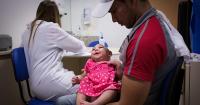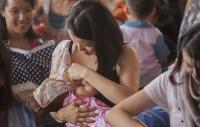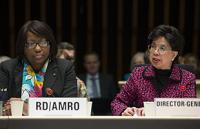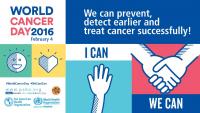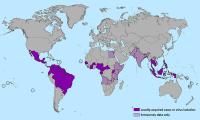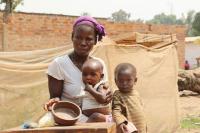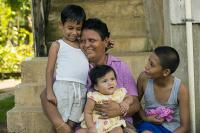You are here
News
-
02/02/2016 - The first meeting of the Emergency Committee (EC) convened by the Director-General under the International Health Regulations (2005) (IHR 2005) regarding clusters of microcephaly cases and other neurologic disorders in some areas affected by Zika virus was held by teleconference on 1 February 2016, from 1310 to 1655 Central European Time.
-
01/29/2016 - Breastfeeding has substantial benefits for women and children in rich and poor countries alike, and now the evidence is stronger than ever. A major new Series on breastfeeding, published in “The Lancet”, finds that despite strong health and economic benefits from breastfeeding, few children are exclusively breastfed until 6 months, as recommended by WHO.
-
01/28/2016 - The World Health Organization (WHO) today called an emergency meeting for Monday on the “dramatic” rise in Zika virus infection – strongly suspected of causing birth malformations – warning that its “explosive” spread could eventually infect up to four million people before it is brought under control.
-
01/27/2016 - PAHO is uniting with the global cancer community to commemorate on February 4th, World Cancer Day with the slogan ‘’We can. I can’’. We seek to promote how everyone – as a collective or as individuals – can do their part to reduce the burden of cancer.
-
01/21/2016 - On January 14th, ISAGS Chief of Staff Luana Bermudez and the Institute’s Technical Consultant on Health Industrial Complex and Regulation Monica Sutton participated in a meeting, convened by Fiocruz, in order to debate potential contributions that will be submitted to the UN High Level Panel on Access to Medicines. Launched on December 11th, the initiative promotes a debate on contradictions between public health needs and international trade, as well as patents.
-
01/21/2016 - With the Zika virus now circulating in 18 countries and territories of Latin America and the Caribbean, the Pan American Health Organization (PAHO) is recommending that its member countries monitor and report any increases in neurological syndromes and congenital anomalies, which growing evidence suggests may be linked to Zika infections.
-
01/21/2016 - An emergency food security assessment by the United Nations World Food Programme (WFP) and its partners has revealed that half the population of the Central African Republic (CAR) – nearly 2.5 million people – faces hunger.
-
01/21/2016 - Health professionals frequently face situations of verbal or physical violence in the course of their duties, which has an impact on their work and health. This is the conclusion of a research paper published in the Pan American Journal of Public Health, the peer-reviewed scientific journal of the Pan American Health Organization (PAHO).
-
01/07/2016 - In 2012, noncommunicable diseases (NCDs) like cancers, diabetes, cardiovascular and lung diseases caused more than half of all deaths among those who died before their 70th birthdays. The vast majority of those deaths occurred in low- and middle-income countries. WHO, through its Global Coordination Mechanism on Noncommunicable Diseases, plays an important role in promoting action between governments, civil society organizations and other players working to improve health by preventing and controlling such diseases.
-
01/06/2016 - The Pan American Health Organization/World Health Organization (WHO/PAHO) is currently accepting applications from public health professionals with managerial or directive experience in public health, international relations or related areas for the Edmundo Granda Ugalde Leaders in International Health Program (LIHP). The application deadline is 15 February 2016.

